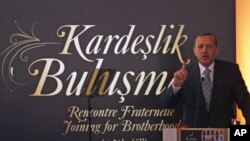ISTANBUL - A last-minute deal has cleared away a dispute over the attendance of senior European Union officials at the NATO summit opening in Chicago Sunday. Analysts saw the dispute as an example of Turkey flexing its growing diplomatic muscle within the military alliance.
With only days to go before the NATO summit, the president of the European Commission, Jose Manuel Barroso, and the head of European Council, Herman Van Rompuy, finally received an official invitation to attend.
The delay was a result of objections by Turkey over what Ankara perceives as a lack of equal treatment between NATO and EU officials.
Turkish Foreign Ministry spokesman Selcuk Unal explains.
"Many countries have questions and wonder why two EU chiefs are invited, while the NATO secretary-general is not invited," said Unal. "Second, why are other international and regional organizations who also deal with NATO not invited or thought to be invited?"
According to Turkish spokesman Unal, the impasse was resolved after it was agreed that the EU leaders will attend the opening ceremony but will be restricted to only certain sessions of the summit, including those related to Afghanistan.
Turkey's stalled EU membership bid is seen as the underlying factor for Ankara playing diplomatic hardball before the summit, says former senior Turkish diplomat Sinan Ulgen.
"It is an indication of how much frustration, disillusionment and even now antagonism has been built over Turkey's accession process, and this is leading to this type of negative environment, where Turkey is trying to leverage with its own relationship with NATO, to put pressure on the EU. In many ways, we are definitely seeing a much more assertive and robust Turkish foreign policy," said Ulgen.
Political observers say the confidence of Ankara to stand up to the EU comes from Turkey's growing regional importance. Turkey borders Syria, Iran and Iraq. And with its charismatic prime minister, Recep Tayyip Erdogan - whose influence and popularity extends across the Arab Spring countries - Ankara has become an increasingly important ally to the United States.
Cengiz Aktar, an international relations expert at Istanbul's Bahcesehir University, says Washington's support gives Ankara an important strategic advantage.
"Turkey has a sort [of] comparative advantage over other countries in the Middle East, the Mediterranean and even Europe," said Aktar. "The government is using and abusing this situation to the bitter end to push its own agenda."
A report this month by the influential U.S.-based Council on Foreign Relations said the growing importance of Turkey is resulting in Washington cultivating stronger ties.
Turkish Foreign Ministry spokesman Unal denies Ankara is following a more assertive policy.
"Countries like Turkey in NATO who are not EU members, but who are NATO members, they have to defend their legitimate rights and interests stemming from NATO membership," he said.
With Turkey increasingly playing an active role in NATO from Kosovo to Afghanistan, political observers warn the potential remains for tensions between Ankara and Brussels to be played out within the Atlantic alliance.
With only days to go before the NATO summit, the president of the European Commission, Jose Manuel Barroso, and the head of European Council, Herman Van Rompuy, finally received an official invitation to attend.
The delay was a result of objections by Turkey over what Ankara perceives as a lack of equal treatment between NATO and EU officials.
Turkish Foreign Ministry spokesman Selcuk Unal explains.
"Many countries have questions and wonder why two EU chiefs are invited, while the NATO secretary-general is not invited," said Unal. "Second, why are other international and regional organizations who also deal with NATO not invited or thought to be invited?"
According to Turkish spokesman Unal, the impasse was resolved after it was agreed that the EU leaders will attend the opening ceremony but will be restricted to only certain sessions of the summit, including those related to Afghanistan.
Turkey's stalled EU membership bid is seen as the underlying factor for Ankara playing diplomatic hardball before the summit, says former senior Turkish diplomat Sinan Ulgen.
"It is an indication of how much frustration, disillusionment and even now antagonism has been built over Turkey's accession process, and this is leading to this type of negative environment, where Turkey is trying to leverage with its own relationship with NATO, to put pressure on the EU. In many ways, we are definitely seeing a much more assertive and robust Turkish foreign policy," said Ulgen.
Political observers say the confidence of Ankara to stand up to the EU comes from Turkey's growing regional importance. Turkey borders Syria, Iran and Iraq. And with its charismatic prime minister, Recep Tayyip Erdogan - whose influence and popularity extends across the Arab Spring countries - Ankara has become an increasingly important ally to the United States.
Cengiz Aktar, an international relations expert at Istanbul's Bahcesehir University, says Washington's support gives Ankara an important strategic advantage.
"Turkey has a sort [of] comparative advantage over other countries in the Middle East, the Mediterranean and even Europe," said Aktar. "The government is using and abusing this situation to the bitter end to push its own agenda."
A report this month by the influential U.S.-based Council on Foreign Relations said the growing importance of Turkey is resulting in Washington cultivating stronger ties.
Turkish Foreign Ministry spokesman Unal denies Ankara is following a more assertive policy.
"Countries like Turkey in NATO who are not EU members, but who are NATO members, they have to defend their legitimate rights and interests stemming from NATO membership," he said.
With Turkey increasingly playing an active role in NATO from Kosovo to Afghanistan, political observers warn the potential remains for tensions between Ankara and Brussels to be played out within the Atlantic alliance.




